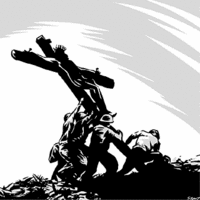NOLA

It's not so much the relentless photographs
of floods, the debris of our lives smashed
and scattered, or even the obsession I have
developed to read something -
anything, about Lessepps Street
where Lee Grue lives.
Kalamu ya Salam made it to Houston, is mostly
off line, Ahmos ZuBolton died last year,
so it's not personal ties or the memories I have
of the Big Easy, or the story this morning about
the Crescent Hotel in the Quarter that brought
up generators one last time to cook a hot
breakfast for everyone, anyone, a piano player
performing Stormy Weather.
It's not sweet memories -- eating
Eggs Benedict at Brennans when I was ten.
My parents took us on a long car trip from Illinois
to California then down through Texas, across to New Orleans
and then back home through the Smoky Mountains,
America the Beautiful, and now devastation,
or walking into a perfume shop
and buying a bottle of White Shoulders
which lasted well into my teens because Mother
insisted it was just for special events,
like church, weddings, graduations, funerals.
It's not the poetry conference in New Orleans
where I met Lee Grue, or the honor
of knowing Tom Dent even slightly,
or the sweet way Ahmos ZuBolton
called me "Little Sister," or the Maple Street Bar
where I read poems with the New Orleans poets,
or the way Ken Fontenot gave us an insider tour
of town that produced incredible and cheap fresh oysters,
or following Lee Grue around the French Quarter
stopping in to hear her neighbors play, the Marcellus
crowd, in a grill across from a confection shop
where we got the best pralines in the world.
I read in the Picayune online edition blog that water
was waist deep on Lessepps Street this morning.
Lee's shot gun house is elevated four or five feet
above street level, so it may be all right, for now.
The long hallway front to back is painted with a mural
of the Mississippi River. Her ex-husband is a Riverboat
Pilot. Her stories and poems are passionately in love
with New Orleans, The French Quarter. Lessepps Street
dead ends into a levee. We walked to Bourbon Street.
It's not the crawfish in huge kettles in any café, po boys,
and delicious Louisiana Red Sauce, Red Beans and Rice.
It's not the food, or even the music that won't ever die
that has me frantic today, wakes me up in the middle
of the night inside a house filling up with water -
to the rafters in the attic. Would we have an axe?
Could we find it?
It's not even the inferno of the Super Dome,
full of sweltering people, thirty thousand, more -
toilets overflowing the way they do in a disgusting
nightmare, but you have to add the stench to that,
and darkness, and tropical heat, and mosquitoes,
exhausted panic setting in, and reality -
real lives to re-build, how?
And will they even survive?
And if they don't, who will go down for criminal
incompetence?
And it's not reservists in Iraq who could be flying
helicopters also in Iraq on rescue missions in New Orleans
or the waste of that, or the atrocity even.
It's more than my own sweet memories,
or the empathetic way I have of living in the world
that has my stomach tied in knots
and a deep fury shaking me like a rag doll.
It's not even the absurd insult
of Martial Law from leaders who should say,
"Take what you need, share what you have."
It's not airlines who stopped flying out of
New Orleans eight hours before they needed
to, who could have staged an heroic evacuation,
and chose not to fly empty planes in to a city
everyone was trying to leave.
Here's the thing.
What if Katrina isn't a 500 year freak?
What if the hurricane scientists are right?
They are saying the temperature of the water,
up two degrees, feeds the rash of
monster hurricanes we've seen this year and last.
What if this is just the first great coastal city
to be buried under water, only the first of many
draughts of petrochemical poison to be jettisoned
into the waters of the earth?
What if this is our last chance to mediate
the horrific effects global warming will have on
everything we know, love and understand?
What if it's too late?
©Susan Bright, 2005
Susan Bright is the author of nineteen books of poetry. She is the editor of Plain View Press which since 1975 has published one-hundred-and-fifty books. Her work as a poet, publisher, activist and educator has taken her all over the United States and abroad. Her most recent book, The Layers of Our Seeing, is a collection of poetry, photographs and essays about peace done in collaboration with photographer Alan Pogue and Middle Eastern journalist, Muna Hamzeh.
Home
What it is About
Earthfamily Principles
Earthfamilyalpha Content
Links















